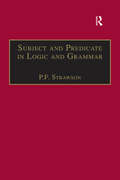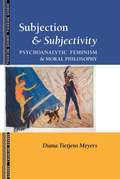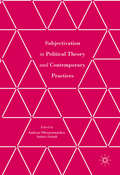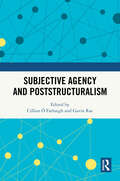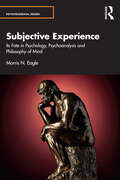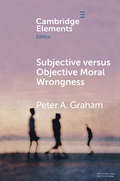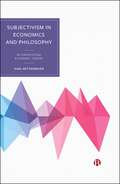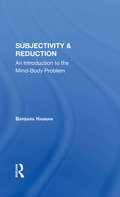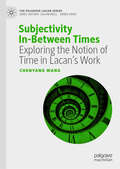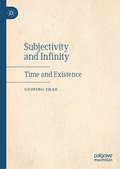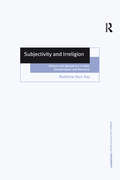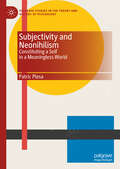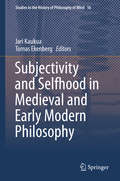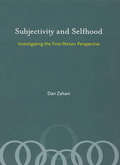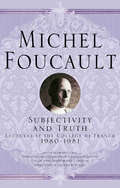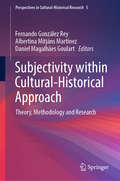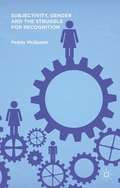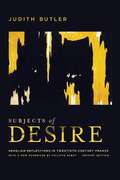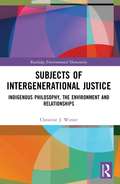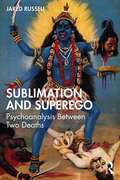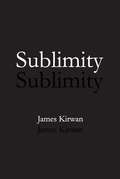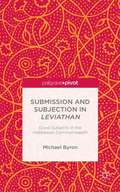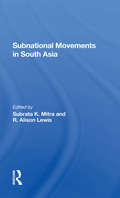- Table View
- List View
Subject and Predicate in Logic and Grammar
by P.F. StrawsonP.F. Strawson has supplied a new introduction for this reissue of his modern classic originally published in 1974. Subject and Predicate in Logic and Grammar explores two conceptions of subject and predicate, one of which lies at the core of standard logic and the other more closely relates to surface forms of natural language. Strawson renders these two conceptions, and their divergences, intelligible by relating them both to the 'basic case' in which the subject-term designates a substantial spatio-temporal individual. Through his treatment of these conceptions, Strawson added to our understanding of both logic and general grammar, helping us trace formal characteristics of logic and its grammar to their roots in general features of thought and experience, and observing how the grammatical structure of a large group of non-formalized languages naturally develops in various ways, along other lines. This book, based originally on seminar material used at Oxford and Princeton and a series of lectures delivered at Irvine and University College London, has become an enduring landmark in the literature of logic and the philosophy of language.
Subjection and Subjectivity: Psychoanalytic Feminism and Moral Philosophy (Thinking Gender)
by Diana T. MeyersDiana Tietjens Meyers examines the political underpinnings of psychoanalytic feminism, analyzing the relation between the nature of the self and the structure of good societies. She argues that impartial reason--the approach to moral reflection which has dominated 20th-century Anglo-American philosophy--is inadequate for addressing real world injustices. Subjection and Subjectivity is central to feminist thought across a wide range of disciplines.
Subjectivation in Political Theory and Contemporary Practices
by Andreas Oberprantacher Andrei SiclodiThis book explores, discusses, and assesses the actual and potential sense of subjectivation in a variety of contexts. In particular, it reflects the genealogies, connections, variations, and practical implications of various theories of subjectivity and subjection while providing an up-to-date and authoritative account of how to engage with the 'subject'. Rather than addressing the 'subject' merely in theoretical terms, this book explores subjectivation as a seminal expression of subjective practices in the plural. To the extent that subjectivity and subjection are key terms in a plurality of discourses and for a number of disciplines, Subjectivation in Political Theory and Contemporary Practices advances a trans-disciplinary reading by taking into account relevant debates that stretch from poststructuralism via postfordism to postdemocracy. In this sense, the book introduces readers to current approaches to subjectivation by displacing conventional understandings and suggesting unexpected reformulations.
Subjective Agency and Poststructuralism
by Gavin Rae Cillian Ó FathaighPoststructuralism has long been acknowledged to offer a radical critique of the foundational subject as a precursor to affirming a constituted subject. Its detractors have however held that the resultant position cannot offer a coherent account of agency (strong version) or, alternatively, that while it may be able to account for non-subjective agency, it is unable to develop a coherent explanation for subjective agency (weak version). Somewhat strangely, this issue has been largely ignored by commentators predisposed to poststructuralist thought. In contrast, this volume focuses on the works of Judith Butler, Cornelius Castoriadis, Gilles Deleuze, Jacques Derrida, Michel Foucault, Luce Irigaray, Jacques Lacan, and Catherine Malabou, to show that the question of the subject is a key one for many poststructuralist thinkers, that they are aware of the problematic status of agency that arises from their decentering of the foundational subject, and that they offer heterogeneous responses to it.Subjective Agency and Poststructuralism will therefore be an invaluable resource for researchers and advanced students interested in philosophy, political theory, psychoanalysis, critical theory, history of ideas, feminist theory, and cultural studies.
Subjective Experience: Its Fate in Psychology, Psychoanalysis and Philosophy of Mind (Psychological Issues)
by Morris N. EagleMorris N. Eagle explores the understanding and role of subjective experience in the disciplines of psychology, psychoanalysis, and philosophy of mind.Elaborating how different understandings of subjective experience give rise to very different theories of the nature of the mind, Eagle then explains how these shape clinical practices. In particular, Eagle addresses the strong tendency in the disciplines concerned with the nature of the mind to overlook the centrality of subjective experience in one's life, to view it with suspicion, and to reduce it to neural processes. Describing examples of research in which subjective experience is a central variable, Eagle provides an outline of a model in which the dichotomy of conscious and unconsious is supplemented by subjective experience as a continuum. This book is essential reading for psychoanalysts, psychoanalytic psychotherapists, psychologists and anyone wishing to gain a deeper understanding of the importance of theories of the mind to therapeutic practice.
Subjective versus Objective Moral Wrongness (Elements in Ethics)
by Peter A. GrahamThere is presently a debate between Subjectivists and Objectivists about moral wrongness. Subjectivism is the view that the moral status of our actions, whether they are morally wrong or not, is grounded in our subjective circumstances – either our beliefs about, or our evidence concerning, the world around us. Objectivism, on the other hand, is the view that the moral status of our actions is grounded in our objective circumstances – all those facts other than those which comprise our subjective circumstances. A third view, Ecumenism, has it that the moral status of our actions is grounded both in our subjective and our objective circumstances. After outlining and evaluating the various arguments both against Subjectivism and against Objectivism, this Element offers a tentative defense of Objectivism about moral wrongness.
Subjectivism in Economics and Philosophy: Re-orientating Economic Theory
by Karl MittermaierAvailable open access digitally under CC-BY-NC-ND licence. Following on from The Hand Behind the Invisible Hand and A Realist Philosophy of Economics, this new book drawn from Karl Mittermaier’s writings examines the intricate relationship between economic theory and real-world economic experiences. Despite the centrality of subjectivism in both philosophy and economics, these fields have often overlooked each other's insights. Mittermaier challenges this disconnect, advocating for a shift from deterministic models to a more reflective approach in economics. He examines the historical, methodological and philosophical dimensions of economic theory, highlighting its struggle to connect economic theory to empirical data and individuals' lived experiences. Originally penned between 1979 and 1982 and now published posthumously, this work remains a crucial contribution to contemporary economic discussions.
Subjectivity And Reduction: An Introduction To The Mind-body Problem
by Barbara HannanContemporary philosophy has seen a proliferation of complex theories and intricate arguments brought to bear on the mind-body problem, perhaps the most intractable of perennial philosophical problems. In this concise and accessible text, Barbara Hannan provides an elegant introduction to this contemporary debate. Her emphasis is upon the clear and even-handed presentation and evaluation of the major theories of the mind, but she does not shrink from contributing to the advancement of the argument, including the presentation of an original account, the theory of "content internalism." Along the way to the formulation of this account, Hannan puts into context and discusses the views of all the major contemporary philosophers writing on the mind, including Lewis, Putnam, Searle, Davidson, Dennett, and Fodor. Combining a deep respect for the depth of the issues with clarity of thought and lucidity of expression, Subjectivity and Reduction is the ideal introduction to the central problem of today's philosophy of mind.
Subjectivity In-Between Times: Exploring the Notion of Time in Lacan’s Work (The Palgrave Lacan Series)
by Chenyang WangThis book is the first to systematically investigate how the notion of time is conceptualised in Jacques Lacan’s work. Through a careful examination of Lacan’s various presentations of time, Chenyang Wang argues that this notion is key to a comprehension of Lacan’s psychoanalytic thinking, and in particular to the way in which he theorises subjectivity. This book demonstrates that time is approached by Lacan not only as consciously experienced, but also as pre-reflectively embodied and symbolically generated. In an analysis that begins with Lacan’s “Logical Time” essay, Chenyang Wang articulates three temporal registers that correspond to Lacan's Real-Symbolic-Imaginary triad and also demonstrates how Lacan’s elaboration of other major themes including consciousness, body, language, desire and sexuality is informed by his original perspectives on time. Filling a significant gap in contemporary Lacanian studies, this book will provide essential reading for students and scholars of psychoanalytic theory, continental philosophy and critical theory.
Subjectivity and Infinity: Time and Existence
by Guoping ZhaoThis book formulates a new theory of subjectivity in the context of the claimed “death of the subject” in the post-modern and post-human age. The new theory is developed against the conception of the subject as a transcendental ego whose constitutive roles, recognition, and representation lead to the objectivization and totalization of the world and denial of its inner infinity and heterogeneity. Critically scrutinizing ideas from Bergson, James, Husserl, Heidegger, Derrida, Zen Buddhism, and Chinese Zhuangzi, and through an analysis of time and temporality, this book advances a number of new concepts, including “primal sensibility” and “pure experience,” and proposes a porous structure of subjectivity with an ex-egological and ex-subjective zone that allows nothingness and absence to ground presence. Such a theory of subjectivity provides the basis for an understanding of thinking as imagination and self-identity as narrative presentation in the intersubjective world.
Subjectivity and Irreligion: Atheism and Agnosticism in Kant, Schopenhauer and Nietzsche (Ashgate New Critical Thinking in Philosophy)
by Matthew Alun RayThis book asks specific philosophical questions about the underlying structure of Kant, Schopenhauer and Nietzsche's thoughts on atheism and agnosticism; thoughts that represent one of the most concerted attacks on monotheistic religion in modern philosophy. Yet commentators interested in philosophical atheism have ignored frequently this tradition. Matthew Ray concludes that Kant's moral theology is largely undersupported; Schopenhauer's metaphysical and ethical atheism is flawed in several areas; and Nietzsche's naturalistic attack on Christianity is only partially successful. Taking a critical stance toward the atheistic orthodoxy in modern philosophy, Ray argues that the question of God's existence remains characteristically unresolved in post-Kantian philosophy.
Subjectivity and Neonihilism: Constituting a Self in a Meaningless World (Palgrave Studies in the Theory and History of Psychology)
by Patric PlesaSubjectivity and Neonihilism examines the current Western sociopolitical climate, revealing how it shapes who we are, how we think of ourselves, and how we create meaning in a seemingly meaningless world. Drawing on critical theory, this book looks at some of the social inequities produced under neoliberal capitalism and the ways these problems are internalized into subjectivity as the neoliberal self. Neoliberal cultural values are shown to reframe social inequities as personal problems and simultaneously create a sense of personal responsibility for solving them within the self, rather than addressing them externally. The author argues that current crises in meaning making and mental health have been exacerbated by the neoliberal values of individualization, responsibilization, self-governance, and competition. Divided into 3 parts, this book begins by outlining the emergence of subjectivity and technologies of the self. It demonstrates how the sociopolitical conditions that amplify social inequities intwine with the hyperawareness of the internet age to create an atmosphere of meaninglessness that is pervasive on social media and in internet culture. In part 2, the author further analyses this phenomenon, here labelled &‘neonihilism&’, as the process in which we confront meaninglessness through irony, questioning whether this might hold the intrinsic condition for overcoming this new nihilism. Part 3 examines the possibility for collective meaning making, solidarity, and collective action afforded by creating an art of nihilating the neoliberal self, or what the author terms &‘the ars nihil&’, via subversion and resistance. This book offers fresh insights that will be of interest to students and scholars of critical theory, psychology, philosophy and sociology.
Subjectivity and Selfhood in Medieval and Early Modern Philosophy
by Jari Kaukua Tomas EkenbergThis book is a collection of studies on topics related to subjectivity and selfhood in medieval and early modern philosophy. The individual contributions approach the theme from a number of angles varying from cognitive and moral psychology to metaphysics and epistemology. Instead of a complete overview on the historical period, the book provides detailed glimpses into some of the most important figures of the period, such as Augustine, Avicenna, Aquinas, Descartes, Spinoza, Leibniz and Hume. The questions addressed include the ethical problems of the location of one's true self and the proper distribution of labour between desire, passion and reason, and the psychological tasks of accounting for subjective experience and self-knowledge and determining different types of self-awareness.
Subjectivity and Selfhood in Medieval and Early Modern Philosophy (Studies in the History of Philosophy of Mind #16)
by Jari Kaukua Tomas EkenbergThis book is a collection of studies on topics related to subjectivity and selfhood in medieval and early modern philosophy. The individual contributions approach the theme from a number of angles varying from cognitive and moral psychology to metaphysics and epistemology. Instead of a complete overview on the historical period, the book provides detailed glimpses into some of the most important figures of the period, such as Augustine, Avicenna, Aquinas, Descartes, Spinoza, Leibniz and Hume. The questions addressed include the ethical problems of the location of one's true self and the proper distribution of labour between desire, passion and reason, and the psychological tasks of accounting for subjective experience and self-knowledge and determining different types of self-awareness.
Subjectivity and Selfhood: Investigating the First-Person Perspective (Bradford Books)
by Dan ZahaviWhat is a self? Does it exist in reality or is it a mere social construct—or is it perhaps a neurologically induced illusion? The legitimacy of the concept of the self has been questioned by both neuroscientists and philosophers in recent years. Countering this, in Subjectivity and Selfhood, Dan Zahavi argues that the notion of self is crucial for a proper understanding of consciousness. He investigates the interrelationships of experience, self-awareness, and selfhood, proposing that none of these three notions can be understood in isolation. Any investigation of the self, Zahavi argues, must take the first-person perspective seriously and focus on the experiential givenness of the self. Subjectivity and Selfhood explores a number of phenomenological analyses pertaining to the nature of consciousness, self, and self-experience in light of contemporary discussions in consciousness research. Philosophical phenomenology—as developed by Husserl, Heidegger, Sartre, Merleau-Ponty, and others—not only addresses crucial issues often absent from current debates over consciousness but also provides a conceptual framework for understanding subjectivity. Zahavi fills the need—given the recent upsurge in theoretical and empirical interest in subjectivity—for an account of the subjective or phenomenal dimension of consciousness that is accessible to researchers and students from a variety of disciplines. His aim is to use phenomenological analyses to clarify issues of central importance to philosophy of mind, cognitive science, developmental psychology, and psychiatry. By engaging in a dialogue with other philosophical and empirical positions, says Zahavi, phenomenology can demonstrate its vitality and contemporary relevance.
Subjectivity and Truth: Lectures at the Collège de France, 1980-1981
by Michel Foucault“The working hypothesis is this: it is true that sexuality as experience is obviously not independent of codes and systems of prohibitions, but it needs to be recalled straightaway that these codes are astonishingly stable, continuous, and slow to change. It needs to be recalled also that the way in which they are observed or transgressed also seems to be very stable and very repetitive. On the other hand, the point of historical mobility, what no doubt change most often, what are most fragile, are modalities of experience.” - Michel Foucault In 1981 Foucault delivered a course of lectures which marked a decisive reorientation in his thought and of the project of a History of Sexuality outlined in 1976. It was in these lectures that arts of living became the focal point around which he developed a new way of thinking about subjectivity. It was also the moment when Foucault problematized a conception of ethics understood as the patient elaboration of a relationship of self to self. It was the study of the sexual experience of the Ancients that made these new conceptual developments possible. Within this framework, Foucault examined medical writings, tracts on marriage, the philosophy of love, or the prognostic value of erotic dreams, for evidence of a structuration of the subject in his relationship to pleasures (aphrodisia) which is prior to the modern construction of a science of sexuality as well as to the Christian fearful obsession with the flesh. What was actually at stake was establishing that the imposition of a scrupulous and interminable hermeneutics of desire was the invention of Christianity. But to do this it was necessary to establish the irreducible specificity of ancient techniques of self. In these lectures, which clearly foreshadow The Use of Pleasures and The Care of Self, Foucault examines the Greek subordination of gender differences to the primacy of an opposition between active and passive, as well as the development by Imperial stoicism of a model of the conjugal bond which advocates unwavering fidelity and shared feelings and which leads to the disqualification of homosexuality.
Subjectivity in the Twenty-First Century
by Romin W. TafarodiWhat is it like to be a person today? To think, feel, and act as an individual in a time of accelerated social, cultural, technological, and political change? This question is inspired by the double meaning of subjectivity as both the 'first-personness' of consciousness (being a subject of experience) and the conditioning of that consciousness within society (being subject to power, authority, or influence). The contributors to this volume explore the perils and promise of the self in today's world. Their shared aim is to describe where we stand and what is at stake as we move ahead in the twenty-first century. They do so by interrogating the historical moment as a predicament of the subject. Their shared focus is on subjectivity as a dialectic of self and other, or individual and society, and how the defining tensions of subjectivity are reflected in contemporary forms of individualism, identity, autonomy, social connection, and political consciousness.
Subjectivity within Cultural-Historical Approach
by Fernando González Rey Albertina Mitjáns Martínez Daniel Magalhães GoulartThis book offers a theoretical and epistemological-methodological framework as an alternative approach to the instrumental-descriptive methodology that has prevailed in psychology to date. It discusses the differences between the proposed approach and other theoretical and methodological positions, such as discourse analysis, phenomenology and hermeneutics. Further, it puts forward a proposal that allows the demands of studying subjectivity to be addressed from a cultural-historical standpoint. The book mainly highlights case studies that have been conducted in various countries, and which employ or depart from the theoretical, epistemological and methodological proposals that guide this book. The research discussed here introduces readers to new discussions on theoretical and methodological issues in subjectivity that have increasingly attracted interest.
Subjectivity, Gender and the Struggle for Recognition
by Paddy McqueenIn this book Paddy McQueen examines the role that 'recognition' plays in our struggles to construct an identity and to make sense of ourselves as gendered beings. It analyses how such struggles for gender recognition are shaped by social discourses and power relations, and considers how feminism can best respond to these issues.
Subjects of Desire: Hegelian Reflections in Twentieth-Century France
by Judith ButlerThis classic work by one of the most important philosophers and critics of our time charts the genesis and trajectory of the desiring subject from Hegel's formulation in Phenomenology of Spirit to its appropriation by Kojève, Hyppolite, Sartre, Lacan, Deleuze, and Foucault. Judith Butler plots the French reception of Hegel and the successive challenges waged against his metaphysics and view of the subject, all while revealing ambiguities within his position. The result is a sophisticated reconsideration of the post-Hegelian tradition that has predominated in modern French thought, and her study remains a provocative and timely intervention in contemporary debates over the unconscious, the powers of subjection, and the subject.
Subjects of Intergenerational Justice: Indigenous Philosophy, the Environment and Relationships (Routledge Environmental Humanities)
by Christine J. WinterThis book challenges mainstream Western IEJ (intergenerational environmental justice) in a manner that privileges indigenous philosophies and highlights the value these philosophies have for solving global environmental problems. Divided into three parts, the book begins by examining the framing of Western liberal environmental, intergenerational and indigenous justice theory and reviews decolonial theory. Using contemporary case studies drawn from the courts, film, biography and protests actions, the second part explores contemporary Māori and Aboriginal experiences of values-conflict in encounters with politics and law. It demonstrates the deep ontological rifts between the philosophies that inform Māori and Aboriginal intergenerational justice (IJ) and those of the West that underpin the politics and law of these two settler states. Existing Western IEJ theories, across distributional, communitarian, human rights based and the capabilities approach to IJ, are tested against obligations and duties of specific Māori and Aboriginal iwi and clans. Finally, in the third part, it explores the ways we relate to time and across generations to create regenerative IJ. Challenging the previous understanding of the conceptualization of time, it posits that it is in how we relate—human to human, human to nonhuman, nonhuman to human—that robust conceptualization of IEJ emerges. This volume presents an imagining of IEJ which accounts for indigenous norms on indigenous terms and explores how this might be applied in national and international responses to climate change and environmental degradation. Demonstrating how assumptions in mainstream justice theory continue to colonise indigenous people and render indigenous knowledge invisible, this book will be of great interest to students and scholars of environmental and intergenerational philosophy, political theory, indigenous studies and decolonial studies, and environmental humanities more broadly.
Sublimation and Superego: Psychoanalysis Between Two Deaths
by Jared RussellThis book integrates a thinking about dilemmas faced in the context of the clinical practice of psychoanalysis today, with contemporary social and political concerns specific to the age of the global consumer marketplace. Beginning with an analysis of the fate of the concept of sublimation in Freud’s work, and its relationship to the elaboration of the concept of the superego in 1923, Jared Russell examines how these concepts provide a lever for integrating psychoanalytic thinking with topics of urgent social concern, beyond the critique of ideology. Taking up topics such as the experience of time, addiction to consumption, and the general consequences of the insinuation of digital technologies at increasingly earlier stages in human development—and thinking these through the lens of what the clinical practice of psychoanalysis teaches us about intimate human relatedness—the book addresses how a philosophically oriented approach to psychoanalysis can illuminate our response to the problems of everyday life under conditions of late capitalism. Drawing on a diverse range of authors such as Freud, Heidegger, Hans Loewald, Christopher Bollas, Lacan, Deleuze and Bernard Stiegler, it is argued that the concepts of sublimation and of the superego must be reinvented with regard to both clinical and critical discourse today if psychoanalysis is to remain relevant to the major issues we face, both individually and collectively, in the twenty-first century. Sublimation and Superego: Psychoanalysis Between Two Deaths stages a unique encounter between philosophy, critical theory and clinical practice that will be of interest to psychoanalysts, scholars of twentieth-century continental philosophy, critical social theorists and mental health practitioners.
Sublimity: The Non-Rational and the Rational in the History of Aesthetics
by James KirwanSublimity addresses the nature of the sublime experience itself, and the function that experience has played, and continues to play, within aesthetic discourse. The book both updates and revises existing treatments of the sublime in the eighteenth century, examines its neglected role in the nineteenth century aesthetics, and analyzes the significance of the modifications the concept has undergone in order to serve the interests of contemporary aesthetics. The book thus offers the most comprehensive coverage of the history of the sublime available.
Submission and Subjection in Leviathan: Good Subjects in the Hobbesian Commonwealth
by Michael ByronLeviathan invests the sovereign with nearly absolute power, and that vast sovereign has drawn the reader's eye for 350 years. Yet Hobbes has much to say about subjects as well, and he articulates a normative conception of a good subject.
Subnational Movements In South Asia
by Robert C Oberst Subrata Mitra R. Alison Lewis R Alison LewisThe idea of the book initially emerged from a panel discussion at the Specialist Group on South Asia of the Political Studies Association, UK, in March 1993. On its tortuous path to publication, it has been enriched by critical comments from Sumit Ganguly, Vernon Hewitt, Iftikhar Malik, Gurharpal Singh and David Taylor. The volume has benefited fromSubrata Mitra's long association with the Centre for Indian Studies at the University of Hull and stimulating discussions with members of the Center for South Asian Studies and the Department of Political Science at the University of California, Berkeley, during his sabbatical term (spring 1994). The contributions, although completed by summer 1994, recognise the ongoing changes throughout the region.
